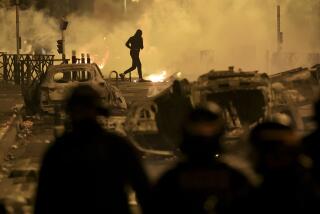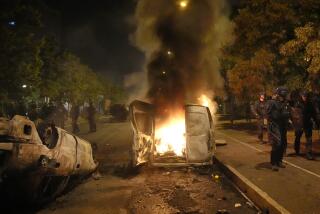British panel says bungled police response was factor in riots
The riots that convulsed Britain in August had no single cause but were driven by hopelessness, deprivation, criminal opportunism and a bungled police response, a government commission said in a report Monday.
Looters and violent offenders were encouraged by weak numbers of police and by the officers’ apparent decision to pull back and not confront them directly, the commission found. That allowed a peaceful protest over a police killing in London to mushroom into a full-blown riot that inspired outbreaks of unrest across the country over five days.
The chaos resulted in the deaths of at least five people and an estimated $800 million in damage and economic losses.
The spasm of violence horrified most Britons, who watched the riots unfurl on wall-to-wall media coverage that itself might have spurred people to join in the rampage, the report says. It warns that riots could happen again without urgent action and that authorities and officials must come up with better contingency plans, especially in the event of a disturbance during next summer’s Olympic Games in London, which are fast becoming a security headache for the government.
The 111-page report offers the preliminary findings of the independent Riot Communities and Victims Panel, which was set up by the government to examine the causes of the unrest, the authorities’ response and ways to prevent a recurrence. A final report is expected in March.
The panel was eager to lay to rest myths that have built up in the riots’ aftermath — for example, that most of the looters were juveniles or members of organized gangs, or that the riots were primarily about race.
Looking at the hundreds of people who were arrested and hauled into court, the panel said the majority were young adults between the ages of 18 and 24; more than half already had criminal records.
Although the initial protests in London centered on the police killing of a young black man, indignation over racial injustice is not what fueled the looters who hurled bricks through shop windows and ran out clutching iPads, flat-screen TVs, cellphones, designer clothes and other merchandise, the panel found.
“In most cases, the primary motivation for rioting was theft,” says the report, which cites one witness as stating: “It wasn’t political. It was shopping.”
Many of those who took part came from disadvantaged backgrounds and had little feeling of a stake in society or of hope for the future.
“The fact that many people abused society’s moral and legal codes when the opportunity arose paints a disturbing picture,” the report says. “Most disturbing to us was a widespread feeling that some rioters had no hope and nothing to lose.”
The report urges officials to address the need to improve access to good education and employment prospects — not an easy task as the government implements the deepest austerity cuts in a generation and as more than 1 million young people languish without jobs, the highest number ever in Britain.
The panel leveled some of its heaviest criticism at the police, whose seemingly confused, confusing and inadequate response to the situation only made it worse.
The authorities did little to counter or quell increasingly inflammatory rumors surrounding their Aug. 4 shooting of Mark Duggan, a young black man, in the northern London district of Tottenham. The circumstances of the slaying remain unclear.
Then, when protests over Duggan’s death escalated, images of officers appearing to back off gave the impression of weakness.
“This, combined with a febrile rumor environment, created an unprecedented explosive cocktail,” the report says.
Many victims of the looting and residents who cowered in their homes feel the police abandoned them, the panel warned, adding that the police must try to repair the loss of trust and figure out a better way to deal with civil disturbances.
“It is fair to say, for the police, the summer riots will totally change the policing of public disorder for the foreseeable future,” the report says.
More to Read
Start your day right
Sign up for Essential California for news, features and recommendations from the L.A. Times and beyond in your inbox six days a week.
You may occasionally receive promotional content from the Los Angeles Times.







